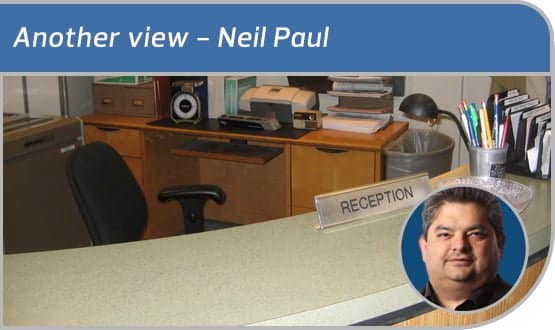Another view: repeats appointments

A recurring theme of my columns is how we can use IT to make general practice more productive. I’ve postulated various roles for IT to help patients who want to make an appointment. These products are now starting to appear.
PROMS work is, I think, the next big step. Reducing needless follow-ups frees up a lot of time. Often we say to patients: “See you in six days, six weeks, six months." Often they are better when they are seen.
This makes for a short consultation, but it’s a waste. I’ve yet to see anyone doing any work on post-consultation reduction outside secondary care. But I’m keen to develop this – so if you are working on something get in touch.
Testing new ideas
Meanwhile, in the past two weeks, I’ve seen and/or tested a couple of the available appointment booking products and they are interesting to compare.
WebGP is a front-end service that bolts on to your practice website. It’s available 24/7 and you need to push as many people as possible to use the website for booking their appointments.
I guess this means it works better in practices with a highly IT literate population; but as a lot of those viral adds show, there are a lot of silver surfers out there.
WebGP was developed by the Hurley Group, which is a large multi-practice group in London. It runs a couple of walk in centres as well as GP practices. Apparently, it has a telephone triage team operating across all of the practices, with nurses who can speak to the patients.
I wonder how easily some of this would translate to rural Cheshire (where I work) or post-industrial Stoke (which is down the road). However, with my federation hat on I can see some of this joint service being the future.
First up, WebGP
The software is quite sophisticated. Essentially, it asks he patient a load of questions and then listens out for so called red flags. If it spots them, it directs people to the appropriate emergency service.
Otherwise, it directs people to services that are appropriate to them. This means it doesn’t just give out GP appointments and this, to my mind, is a huge win.
It tries to push self-care. It provides links to NHS Choices leaflets. It directs people to chemists. It sends people to other services; and I understand that it’s possible to do a fair bit of local customisation.
I believe it can send some enquiries to the NP phone-back line and, eventually, to allows some people to book an appointment.
It doesn’t appear to be a dragon – standing guard over GPs and stopping people from getting an appointment, even if they want one – its purpose is to get people the best outcome.
And if they do get an appointment, then the patient has already filled in a script about what is wrong with them. This is made available to the clinician seeing them; hopefully speeding up the consultation, or enabling the clinician to work with more information.
It looks very good. However, it is very expensive. For my 23,000-person practice, it would cost £18,000. That’s a lot. There is some data available, but I wonder if there is enough to convince me that I could save a receptionist or 1/5 of a doctor.
What kind of adopter are you?
There is an interesting book called ‘Crossing the Chasm’. It talks about new IT inventions. Innovators come up with an idea and help to design/develop the product.
Early adopters see the benefits. They understand that the product isn’t finished. They want input – they are optimistic that the product will deliver; they understand there is a risk it won’t. Then there is a chasm.
The early majority are your real customers. They want a solid business case; they want to understand that if they spend x it saves y.
WebGP has given me a concrete example of what the book is talking about. Your attitude towards a product will depend on where you are in the sales curve. I suspect my surgery is in the early majority. Either someone else needs to pay for it, or I need to understand the business case much more accurately.
Second up, iPlato
In the case of the other product, iPlato, my surgery was an early adopter. iPlato is one of the GPSoC-approved, two-way SMS services. It’s very good.
Our commissioning support unit choose it for our area. Our GP alliance has helped fund SMS messages for our practices to gain the most from it. We have been rolling it out and we all get the idea that getting answers back is beneficial. We don’t need to see the numbers – it just makes sense.
iPlato also has an app. Quite a few companies are bringing them out – last month I mentioned the online market appears to be deregulating and everyone is bringing out an app to check appointments, cancel them and so forth.
As part of installing iPlato (and presumably all of its competitors) you have to ping all patients an opt-out message. Part of that message advertises the app, which is free. After it went out, the company got 2,500 downloads in a weekend from my surgery.
Filling slots is a mistake
The app has some nice functionality. However, we decided to turn on the appointment booking. We have always had some of our appointments available to book online through our website but, historically, we have locked that down to ‘usual doctor’ only.
Recently, Emis appears to have removed that option, so we have offered fewer appointments this way (otherwise, people book in to see the next available doctor about things they may know nothing about).
However, we felt we would try again and allowed three GPs to be bookable through the app. What a disaster!
We have had people book pill checks with doctors who don’t do them in our practice. We have had patients book to see a GP to discuss the results of tests that another GP ordered.
It’s the complete opposite to the WebGP idea of getting the patient the best outcome; the iPlato app just allows people to fill slots. Which, unfortunately, means it needs a lot of work.
Now, I must stress I don’t think it’s just this product. As the online market opens up, any potential app creator needs to think about the needs of the practice – not just the needs of the consumer.
Unfettered access to appointments is a huge step backward. The app, however, is the future. It’s clear from initial data that plenty of people are checking their appointments and cancelling them using the app; which hopefully is saving us calls. So I’m not against the idea; it’s the execution.
About the author: Dr Neil Paul is a full time partner at Sandbach GPs, a large (21,000 patient) practice in a semi rural Cheshire. He is one of five executive GPs for NHS South Cheshire CCG and has a mixed portfolio that includes IT.
He was previously on the PEC of NHS Central and East Cheshire. He also writes iPhone software, runs a primary care clinical trials unit and is involved in several exciting IT projects. Last week, it was announced that he is the 2016 winner of the BCS Primary Healthcare Specialist Group's John Perry prize, for his work on Apex, a BI tool for GPs.




